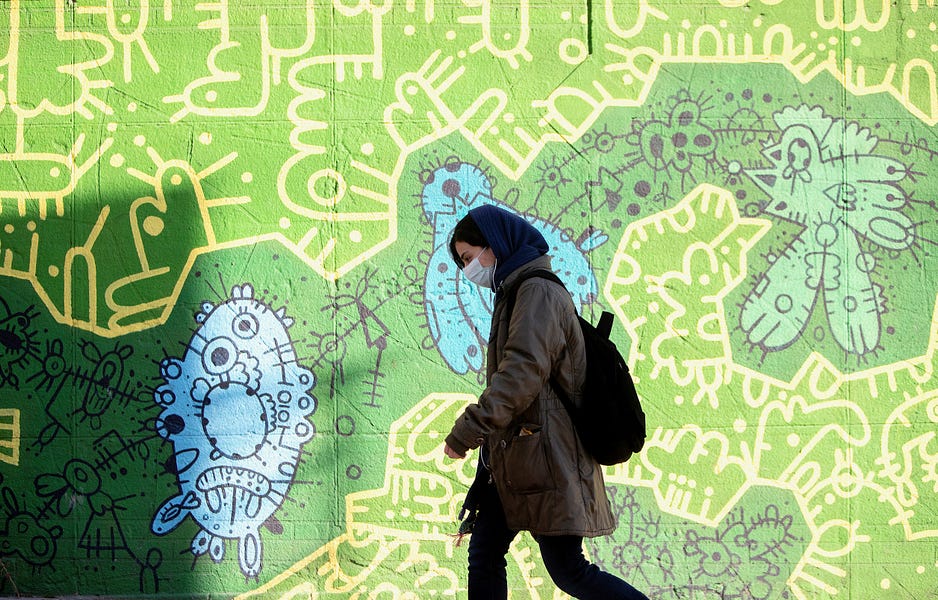Iran’s Supreme Leader Ayatollah Ali Khamenei recently announced that he is banning the use of COVID-19 vaccines from Western countries, including the U.K.’s Oxford/AstraZeneca vaccine and the collaboration between U.S.-based Pfizer and Germany’s BioNTech. He called these lifesaving agents “untrustworthy” and likely to “contaminate other nations,” and Iran has instead opted to cooperate with Cuba on its vaccine trials. The fact that the Middle East nation hardest-hit by COVID is opting out of lifesaving choices further lays bare the bankruptcy of authoritarian rule.
The malign crossroads of authoritarian government and public health are likewise apparent in China’s vaccine efforts. Let’s set aside for a moment China’s culpability at the outbreak of the pandemic, its decision to ban World Health Organization researchers, and its lies about how widespread COVID actually is in the People’s Republic: This month, researchers in Brazil announced that a Chinese vaccine is far less effective than advertised. The “Coronavac” jab, which China’s state-owned Sinopharm credits with a 79.3 percent success rate in immunizing against the virus, actually demonstrates an efficacy rate of 50.4 percent. And yet Chinese state media continue to claim that its vaccine is 100 percent effective in severe cases and could reduce hospitalizations by 80 percent.
Meanwhile, Russia is facing its own vaccination problems. Although the government has touted a 90 percent efficacy rate in trials, Russian doctors have expressed skepticism toward the Sputnik-V vaccine, with many inside the country opting out of its vaccination effort. Having worked on the vaccine or on the pandemic front lines presents its own health risk of sorts: One Russian research physician was stabbed and no fewer than three doctors have mysteriously fallen out of windows. Moscow reported last month that fewer than 56,000 people had died of the virus, but new data suggests that number is closer to 186,000. In these circumstances, it’s odd that President Vladimir Putin himself waited months after approving the vaccine to take it.
Over in North Korea, the Chinese government generously shared one of its vaccine candidates with Kim Jong-un and senior officials in Pyongyang. While the country shut its border in late January and continues to report zero cases, health officials remain skeptical of North Korea’s figures. “Disease control” stations have reportedly popped up all over the country, but with only thermometers to test for the virus, it’s likely North Koreans are indeed dying from COVID.
In Turkey, months of “sugarcoating” numbers has concealed a deadly toll. Officials have approved the same Chinese vaccine that Brazil reported to be 50 percent effective, with their tests crediting the vaccine with 91 percent efficacy. True, not true? Hard to know, as the Turkish government has made hundreds of COVID-related arrests, including a number of journalists reporting on case numbers.
There are few heroes in the global COVID story. The United States and United Kingdom have struggled with the virus’ impact, and leaders have come in for stinging criticism. That said, both debate and science-driven research have been vibrant, a key difference between free states and authoritarian ones. But this is not simply another indictment of the world’s growing number of tyrannies; the impact of the Chinese and Russian dictatorships will ripple across the developing world, as less-developed nations turn to patrons in Beijing and Moscow for relief from COVID. At least 10 countries, including Indonesia (population 270 million) and Pakistan (population 215 million), have ordered hundreds of millions of doses of the Chinese Sinopharm vaccine. Egypt (population 100 million) will be at the center of Sinopharm’s distribution in Africa. Russia’s buddies, including much beleaguered Venezuela, have ordered tens of millions of doses of the Sputnik-V shot.
What will that mean? If both Russia’s and China’s vaccines are suspect, the “cure” they tout will be elusive. For millions across the United States and Europe, that will mean little to their day-to-day health. After all, the Pfizer, Moderna, Astra-Zeneca and other jabs have been tested and retested with little view to the political popularity of European and American leaders. But for much of Asia, Africa, and Latin America, the story will be different, and COVID is likely to continue to rage.
In Iran, waiting to be rescued by Communist Cuba, there are about 6,000 new COVID cases a day and more than 56,000 reported deaths so far in a nation of 84 million. How many more will needlessly die in the meantime? It’s hard to know. As in most authoritarian states, spurious assurances from the government, disinformation about American and European plots, and unverified theories will likely again prove a failing and fatal strategy for the hundreds of millions who suffer under their regimes. For too many nations, the game remains the same: political power above the health and well-being of the people.
Danielle Pletka is a senior fellow at the American Enterprise Institute. Alexa Santry is a research associate at the American Enterprise Institute and the producer of the podcast What the Hell is Going On?






Please note that we at The Dispatch hold ourselves, our work, and our commenters to a higher standard than other places on the internet. We welcome comments that foster genuine debate or discussion—including comments critical of us or our work—but responses that include ad hominem attacks on fellow Dispatch members or are intended to stoke fear and anger may be moderated.
With your membership, you only have the ability to comment on The Morning Dispatch articles. Consider upgrading to join the conversation everywhere.